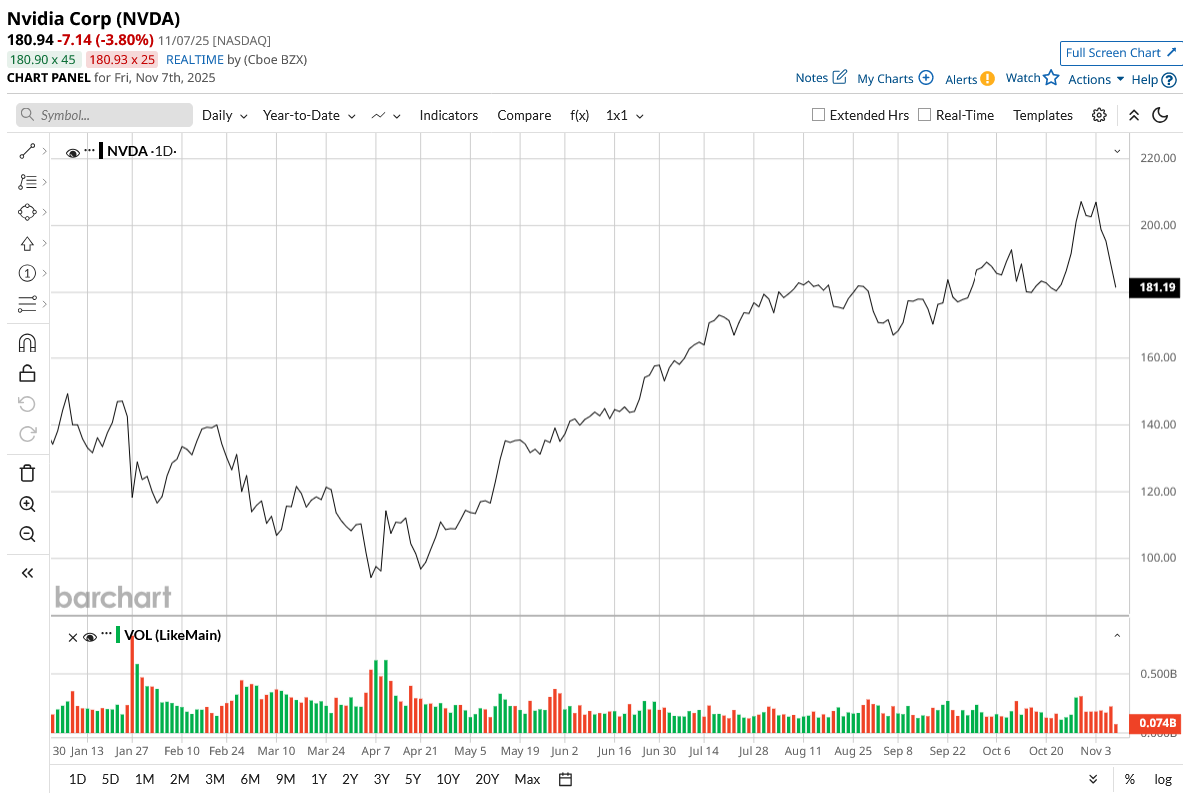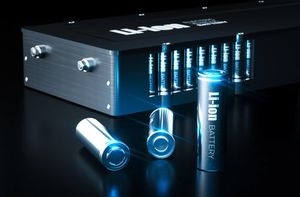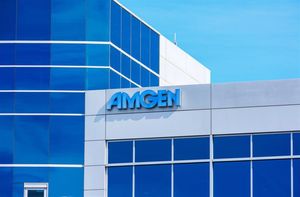"China is going to win the AI race." These are words not coming from the Chinese President Xi Jinping or anybody from the Communist Party of the world's second-largest economy. Rather, it is the opinion aired by the new close White House ally and the CEO of the most consequential company in the world right now, Nvidia (NVDA).
The statement may have been born out of frustration, as Nvidia is severely restricted from selling its chips to the Asian powerhouse, or Huang may be donning his diplomat hat to convey a signal to the leaders of the U.S. and China to include concessions for his company in the trade talks.
Nvidia and China
China was a market of much significance for Nvidia. In FY 2023, the country accounted for 21.4% of the total annual revenues of the company. It has been on a decline ever since, with FY 2024's share at 16.9% and FY 2025 at 13.1%. Yet, even at the reduced level of FY 2025, China sales accounted for a substantial $17.11 billion for Nvidia in FY 2025.
Consequently, as it has dropped to nearly zero, Huang's consternation is understandable as he looks for ways to resume sales to a country. Yet, his assertions that the U.S. would gain a vital edge in the AI race if his company's chips are used by China to build its AI capabilities have still not found favor in the Trump administration, with the president categorically stating in a recent interview that the sales of the most advanced chips to China are not going to happen. Today, the government informed federal agencies that it'll block even the scaled-down versions as well.
Conversely, China is also heavily discouraging its enterprises from using the previous-generation Nvidia H20 chips to build their AI stacks due to alleged security concerns. Additionally, Nvidia agreed to remit 15% of its revenues from China sales (including H20) to the U.S. government as part of the export licensing arrangement. Thus, while Nvidia could sell H20 chips to China for a period, the business has faced significant regulatory and political challenges from both sides.
But, then, how has China enhanced its AI credentials so much that the centerpiece of the AI revolution has conceded that it will win the AI race? Well, the answer is Huawei.
Nvidia vs. Huawei
To set the record straight, Nvidia and the wider ecosystem it provides, along with skepticism around China in many parts of the world, are keeping the Jensen Huang-led company ahead in the AI race. And it may be so in the near future as well, notwithstanding Huang's rhetoric.
Although the Hopper chips allowed for export to China lag Huawei's Ascend series of chips, when it comes to Blackwell, Nvidia “trumps” Huawei.
For instance, Blackwell delivers up to around 4,000 TOPS on tensor operations with very strong mixed precision and FP32/FP64 performance. In contrast, Huawei's Ascend 910C reaches just about 256 TOPS, focusing more on inference than training. Notably, the upcoming Ascend 950 aims to deliver around 2 PetaFLOPS (FP4), which is significantly lower than Nvidia’s raw compute. TOPS stands for "Tera Operations Per Second," which measures the computational performance of AI chips or processors.
Coming to memory, Nvidia’s chips offer higher memory bandwidth, exceeding 2.5-3 TB/second, compared to Huawei's 620 GB/second.
Additionally, Nvidia GPUs have superior software support with CUDA and large ecosystem maturity, enabling a broad application across global AI workloads. On the other hand, Huawei’s ecosystem and software stack remain more limited and less adopted outside China.
Finally, Huawei's strategy involves assembling many of its latest Ascend AI chips into large-scale supercomputing clusters called SuperPoDs. This essentially means that for Huawei to compete with Nvidia, it requires several chips to work as a collective to match the raw performance or efficiency of Nvidia’s Blackwell GPUs. This also results in higher power consumption for the Ascend chips over Nvidia's Blackwell.
Nvidia Is Here to Stay for a Long Time
Shifting focus from its China issues, Nvidia is a fundamentally solid company, with a moat that will not be easy to replicate. And shareholders have been eminently rewarded for sticking with Nvidia.
The stock is up a gargantuan 1,314% over the past five years and is already up 36% on a year-to-date (YTD) basis. Moreover, with a market cap of $4.6 trillion, it is the most valuable company in the world.

Notably, Nvidia's financial metrics provide compelling validation of its upward momentum, having achieved CAGRs of 42.52% in revenue and 66.59% in earnings per share across the preceding decade. Projections for the periods ahead maintain this positive tenor, with consensus estimates calling for revenue advancement of 67.68% and EPS expansion of 74.45%, levels that substantially outpace the sector averages of 7.64% for revenue and 11.58% for earnings.
The company's third-quarter results proved equally robust, exceeding market expectations on key indicators. Revenue attained $46.7 billion, marking a 56% rise relative to the comparable quarter last year. EPS registered $1.05, surpassing the Wall Street projection of $1.01 while reflecting 54% growth on a year-over-year (YoY) basis.
Analyst Opinion on NVDA Stock
Thus, analysts continue to rate the NVDA stock highly, with a “Strong Buy” rating and a mean target price of $234.51. This indicates upside potential of about 30% from current levels. Out of 47 analysts covering the stock, 40 have a “Strong Buy” rating, two have a “Moderate Buy” rating, four have a “Hold” rating, and one has a “Strong Sell” rating.

On the date of publication, Pathikrit Bose did not have (either directly or indirectly) positions in any of the securities mentioned in this article. All information and data in this article is solely for informational purposes. For more information please view the Barchart Disclosure Policy here.
More news from Barchart






